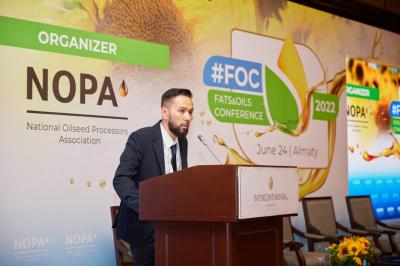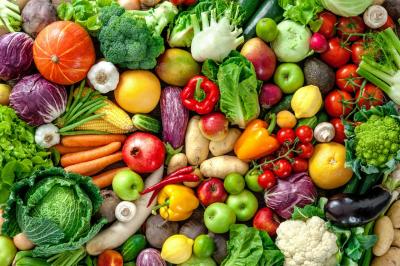
Mandatory labelling of all food products manufactured or imported in Kazakhstan will increase producer costs, increase commodity prices and complicate all existing business processes. This was announced by representatives of major production associations at the press conference on the subject in Kazakhstan Press Club, which was held recently online and offline.
The main subject of the press conference, which was closely watched by the editorial staff of the World of Nan agency, was the appeal of manufacturers (ALE "Dairy Union of Kazakhstan", ALE "Association of Non-Alcoholic Juice Beverages Producers of Kazakhstan", ALE "Union of Brewers of Kazakhstan", ALE "Association of sugar, food and processing industry", ALE "Meat Union of RK", ALE "Association of farmers of Kazakhstan" and so on) to the President of Kazakhstan Kassym-Jomart Tokayev with an appeal to stop the procedure of accelerated introduction of labelling in Kazakhstan.
A little introduction to the core of the issue. In 2019, all the countries of the Eurasian Economic Union signed an agreement under which labelling of manufactured products will be introduced in the territory of the Union's member states. However, it was stipulated that each country can introduce its own national marking system, i.e. make it relatively flexible and optional.
At the same time, Russia has a different conceptual approach - labelling should be mandatory for all types of products starting in 2024. In this connection, a situation has developed where the EEU countries, actually being in a single system, should be "joining in" under this concept.
Thus, on September 7, by the protocol decision of the First Deputy Prime Minister of the Republic of Kazakhstan Alikhan Smailov, specific measures were defined for the accelerated introduction of total marking in Kazakhstan. And already on 14 September the EEU Council reached an agreement in principle on the introduction of marking for certain types of dairy products.
Thus, Kazakhstan's authorized bodies agreed to introduce dairy products into the system of compulsory marking without the necessary procedures - regulatory impact analysis, pilot stage, and feasibility analysis of such a step.
"This decision put Kazakhstan's dairy industry producers in a desperate situation. It also caused extreme indignation among food producers, as Kazakhstan's government agencies ignored the basic norms proposed and laid down by the Kazakhstan side, according to which, the EEU member states have the right to independently determine the dates of introduction of mandatory labeling, based on the degree of readiness of national marking systems and traceability of goods," stated President of the Kazakhstan Sugar, Food and Processing Industry Association Aizhan Naurzgaliyeva.
According to her, the situation in Kazakhstan is unacceptable for producers - synchronisation of Kazakhstan's approaches with Russian ones.
"The business community is against the main labelling approach proposed by Russian partners - the introduction of forced, high-cost, mandatory, total labelling for all types of goods. This approach is fundamentally different from international experience, where marking and the corresponding traceability system was introduced only for a very narrow range of goods, with a proven level of counterfeiting.
We express our firm belief that labelling by means of identification, as a tool to combat counterfeit products and illegal trafficking, should be voluntary when the manufacturer is directly interested in the proposed measure. In the case of government involvement, labelling should be introduced only for those categories of goods where the feasibility of introducing this measure has been proved and justified. In this case, the task lies within the state's area of responsibility and should not fall on bona fide manufacturers," said Aizhan Naurzgaliyeva.
She stressed that the implementation of individual, most costly decisions of the Union's bodies (including marking) is not a reasonable measure, given that all business today has moved into a regime of austerity and optimization of its processes.
"The Kazakhstan economy is experiencing serious consequences caused by the economic crisis even without the introduction of labelling. Further pressure on conscientious manufacturers in the form of such initiatives undermines the confidence of private investors and causes an increasing trend of reduced investment in the Kazakhstan economy, as well as the withdrawal of capital from Kazakhstan.
Respected Kassym-Jomart Kemelevich, the review of the main labelling approaches in terms of reasonableness, timeliness and voluntariness is seen by the entire business community as a real measure that can support all manufacturers and importers of consumer goods. This is especially important in a time of crisis, when the population is switching to a regime of austerity in daily spending even on essential goods," concluded Aizhan Naurzgaliyeva.
According to another speaker, Aliya Mamytbayeva, Executive Director of the Association of Non-alcoholic Beverage and Juice Producers, the main goal of the introduction of labelling is the fight against illegal product trafficking.
"In practice, an additional traceability system is proposed, which is completely redundant, as Kazakhstan already has a fairly effective traceability system, operating through electronic invoices and online cash registers. All of our food products are in an organized trade system, where all movements are recorded and regulated by applicable laws. That is, all the necessary marking elements are already in place, especially in terms of product safety," said Aliya Mamytbayeva.
At the same time, she stressed that, as far as non-alcoholic beverages are concerned, products are packaged in small containers, so it is simply not profitable to create counterfeit samples. Therefore, if there is a certain percentage of counterfeit products, it is within the statistical error. However, the cost of products is low, so there is simply no point in labelling them. This means that the regulatory steps that are being taken are clearly incomplete.
"There is also a very important point here that product prices will increase significantly as a result of the introduction of labelling. For example, for our industry, preliminary calculations show that the cost of labeling alone will be approximately 9 billion tenge, and this is a very modest estimate, because the process of product movement through distribution channels is not considered here. In terms of one-off costs for manufacturers, given that our industry uses high-tech equipment, the costs will range from 31,000 to 58,000 euros per company. In other words, as a result of the introduction of labelling, the cost of products is expected to increase by approximately 7-10%. At the same time, the level of consumption reduction may reach 14%," said Aliya Mamytbayeva.
Also, according to her, in technical terms, enterprises will face a slowdown in work processes and in some cases, a complete halt in production. In addition, a change in warehouse logistics will be required, which will slow down all further logistics processes.
"All this load will fall on conscientious manufacturers. The food industry is 80% made up of small and medium-sized companies, so it can be understood that equipment costs alone can take most of these businesses out of business. In general, businesses are offered a system that is not confirmed by real data. There are no clear effects. We - conscientious manufacturers - do not understand why we need to get entrepreneurs into such an expensive and unnecessary additional labelling system," concluded Aliya Mamytbayeva.
Another speaker, Anastasia Kalashnikova, Executive Director of the Association of Direct Sales of the Republic of Kazakhstan, focused on the problems arising from the introduction of new labelling for importing companies that have production in different countries.
"Today we supply products from Asia, Europe and America directly to Kazakhstan, we do not have any problems. Tomorrow, when the labelling proposed today by our Russian colleagues will be introduced, we will be forced to bring products manufactured at different plants to the same warehouse, for example, in Europe, unpack them, apply the labelling, pack them back up and then send the consolidated cargo. All this will cause significant price increases. We believe that the value of our goods will increase by more than 10%. It will also lead to a significant reduction in the range of products, because products with low margins will be washed out of the market, most often the most traded goods. As a result, consumption will be reduced, the level of taxes coming to the budget will be reduced, and customers will have to go to foreign online shops because their products will be more affordable than those offered by our legal business," said Anastasia Kalashnikova.
According to her, the latest statistics show that retail trade in Kazakhstan has already "subsided" as a result of the crisis caused by the COVID-19 pandemic.
"Do we need labelling that will exacerbate these effects? This means that, because of the labelling, you will be paying for an ordinal number on each package of purchased goods. Will this help our economy to recover? In our opinion, digitalization should improve human life, not create new problems," concluded Anastasia Kalashnikova.
In general, we can summarize that, according to the participants of the press conference, the total marking of manufactured goods will be a costly step for business and inefficient for the market, which in the post-coronavirus crisis will negatively affect the fragile economic balance that exists today.
We can only wait for officials to react to the joint appeal of domestic manufacturers, and for some consensus to be reached on this issue.
The editorial staff of the World of Nan will continue to monitor developments.












































Обсуждение